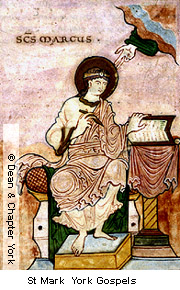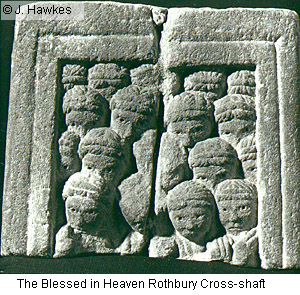
Patterns of Pilgrimage in England c.600-c.1100
Life as Pilgrimage in Anglo-Saxon Christianity: From exile to heavenly home

Pilgrimage concepts in Anglo-Saxon Christianity

"We are in the country of exile of this world; we are exiles, and always have been since the first parent of humankind broke God's commands; and so in sin we were sent on this miserable pilgrimage and now ever after we have to look for another homeland."
Blickling Homilies II
The notion of pilgrimage as it was absorbed by the Anglo-Saxon Church was remarkably flexible. Life was itself understood as pilgrimage, a journey from cradle to grave; Christian life, or the life of faith, was a pilgrim-journey from the illusory material life of this world to the real world of the presence of God. The lives of monks, nuns and hermits were viewed as a kind of inner journey. The Anglo-Saxons also practised pilgrimage to holy places, both within England and beyond (see Place Pilgrimage in the Anglo-Saxon Church). Much of medieval Christian life and teaching was therefore embraced within this breadth of understanding: Heaven was the ultimate destination, but Hell a fearful alternative; angels and saints helped pilgrims on their way, while devils tried to seduce and lead them astray; the experience of exile and the practice of asceticism reminded the pilgrim of the spiritual home to be sought through suffering and self-denial. Through the sacraments, the worship and teaching of the Church (delivered both through the words of sermons and the images contained in sculpture and manuscripts), individuals and communities were encouraged to pursue the journey towards the heavenly home.
Many aspects of Anglo-Saxon life were given new meaning by the cluster of associations surrounding pilgrimage. Attendance at a shrine for heathen sacrifice was replaced with church attendance (in the plan of Gregory the Great), but visits to more important sacred sites might readily and naturally have mutated into pilgrimage to holy places. Travel to regional moots for judicial and administrative purposes may have reminded people of life's journey towards Judgement Day. Judicial and voluntary exile (outlawry or escape) could become, within the penitential structures of the Church, a particular kind of pilgrimage with the possibility of achieving forgiveness. The extent to which pilgrimage concepts permeated and resonated within Anglo-Saxon thought can be seen clearly in Anglo-Saxon literature.
Pilgrimage themes in Anglo-Saxon Literature

Uton we hycgan hwær we ham agen,
ond Þonne geÞencan hu we Þider cumen,
Let us think where we have our home
and then consider how we might get there
Seafarer 117-8
The multiple interpretations of pilgrimage inherited by the Anglo-Saxon Church are woven into a variety of Anglo-Saxon texts. For both poets and preachers, the concept of human life as a pilgrimage, was doubly significant. It provided both a framework for understanding the history of humankind (from the expulsion of Adam from the Garden of Eden to the Last Judgement) and a context for the individual histories of men and women who needed to turn involuntary exile on earth into a purposeful spiritual journey towards Heaven.
From the New Testament onwards, Christian views of life as pilgrimage have not only stressed humankind's present exile on earth but also prospective citizenship of the heavenly homeland, contrasting the transience of earthly pleasures with the eternal joys of the Heavenly City of Jerusalem. The essential interdependence of this cluster of images is evident in Old English literature and the use of one element in a poem or prose work frequently signals the presence, whether implicit or explicit, of the others. Moreover the themes of human life as exile from God's presence and the ongoing quest for the heavenly homeland appear to have been so fundamental to the worldview of those who produced Old English poetry and prose that they are frequently alluded to without explanation or amplification, as in the Old English Exodus or the Dream of the Rood.
The theme of exile, whether voluntary or involuntary, had a particular resonance within the Anglo-Saxon world and a number of poems consider experiences of loss, separation and struggle. Whilst it did not reject the importance of relationships and community, Christianity offered perspectives that transcended earthly gain or loss and offered comfort to all exiles whether voluntary or the victims of circumstances. These perspectives can be seen in the poems known as the Wanderer and the Seafarer, Guthlac A and Guthlac B, in which the saint voluntarily undertakes a life of exile in the fens in order to reach heaven, and saints' lives such as Andrea and Juliana, in which the individuals' secure identity as citizens of heaven enables them to overcome tribulation and persecution.
Paul Cavill



